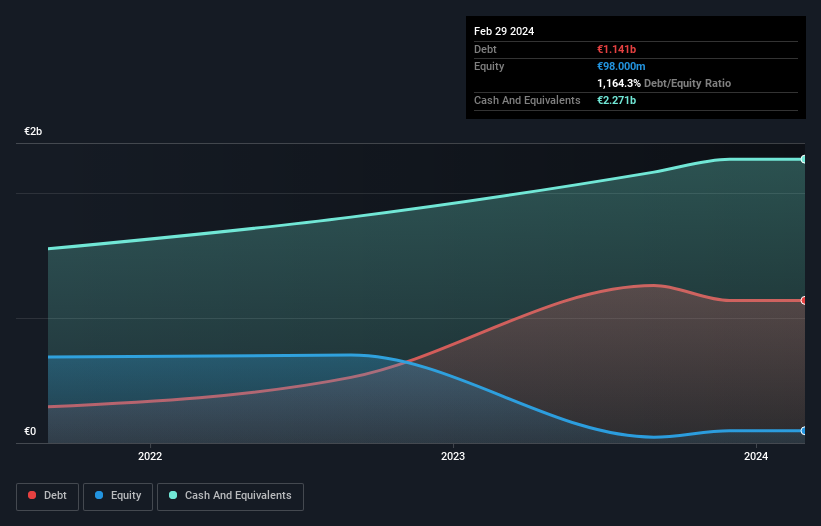Warren Buffett famously said, 'Volatility is far from synonymous with risk.' When we think about how risky a company is, we always like to look at its use of debt, since debt overload can lead to ruin. Importantly, Pluxee N.V. (EPA:PLX) does carry debt. But the real question is whether this debt is making the company risky.
What Risk Does Debt Bring?
Generally speaking, debt only becomes a real problem when a company can't easily pay it off, either by raising capital or with its own cash flow. Ultimately, if the company can't fulfill its legal obligations to repay debt, shareholders could walk away with nothing. However, a more frequent (but still costly) occurrence is where a company must issue shares at bargain-basement prices, permanently diluting shareholders, just to shore up its balance sheet. By replacing dilution, though, debt can be an extremely good tool for businesses that need capital to invest in growth at high rates of return. The first step when considering a company's debt levels is to consider its cash and debt together.
See our latest analysis for Pluxee
How Much Debt Does Pluxee Carry?
You can click the graphic below for the historical numbers, but it shows that as of February 2024 Pluxee had €1.14b of debt, an increase on €525.0m, over one year. But on the other hand it also has €2.27b in cash, leading to a €1.13b net cash position.

How Strong Is Pluxee's Balance Sheet?
According to the last reported balance sheet, Pluxee had liabilities of €5.75b due within 12 months, and liabilities of €289.0m due beyond 12 months. On the other hand, it had cash of €2.27b and €1.50b worth of receivables due within a year. So its liabilities total €2.27b more than the combination of its cash and short-term receivables.
This deficit is considerable relative to its market capitalization of €2.99b, so it does suggest shareholders should keep an eye on Pluxee's use of debt. Should its lenders demand that it shore up the balance sheet, shareholders would likely face severe dilution. Despite its noteworthy liabilities, Pluxee boasts net cash, so it's fair to say it does not have a heavy debt load!
On top of that, Pluxee grew its EBIT by 36% over the last twelve months, and that growth will make it easier to handle its debt. The balance sheet is clearly the area to focus on when you are analysing debt. But it is future earnings, more than anything, that will determine Pluxee's ability to maintain a healthy balance sheet going forward. So if you want to see what the professionals think, you might find this free report on analyst profit forecasts to be interesting.
Finally, while the tax-man may adore accounting profits, lenders only accept cold hard cash. Pluxee may have net cash on the balance sheet, but it is still interesting to look at how well the business converts its earnings before interest and tax (EBIT) to free cash flow, because that will influence both its need for, and its capacity to manage debt. Happily for any shareholders, Pluxee actually produced more free cash flow than EBIT over the last three years. That sort of strong cash conversion gets us as excited as the crowd when the beat drops at a Daft Punk concert.
Summing Up
While Pluxee does have more liabilities than liquid assets, it also has net cash of €1.13b. The cherry on top was that in converted 110% of that EBIT to free cash flow, bringing in €359m. So is Pluxee's debt a risk? It doesn't seem so to us. There's no doubt that we learn most about debt from the balance sheet. However, not all investment risk resides within the balance sheet - far from it. Be aware that Pluxee is showing 2 warning signs in our investment analysis , you should know about...
If, after all that, you're more interested in a fast growing company with a rock-solid balance sheet, then check out our list of net cash growth stocks without delay.
New: Manage All Your Stock Portfolios in One Place
We've created the ultimate portfolio companion for stock investors, and it's free.
• Connect an unlimited number of Portfolios and see your total in one currency
• Be alerted to new Warning Signs or Risks via email or mobile
• Track the Fair Value of your stocks
Have feedback on this article? Concerned about the content? Get in touch with us directly. Alternatively, email editorial-team (at) simplywallst.com.
This article by Simply Wall St is general in nature. We provide commentary based on historical data and analyst forecasts only using an unbiased methodology and our articles are not intended to be financial advice. It does not constitute a recommendation to buy or sell any stock, and does not take account of your objectives, or your financial situation. We aim to bring you long-term focused analysis driven by fundamental data. Note that our analysis may not factor in the latest price-sensitive company announcements or qualitative material. Simply Wall St has no position in any stocks mentioned.
About ENXTPA:PLX
Pluxee
Offers employee benefits and engagement solutions services in France, Latin America, Continental Europe, and internationally.
Undervalued with solid track record.
Similar Companies
Market Insights
Community Narratives




